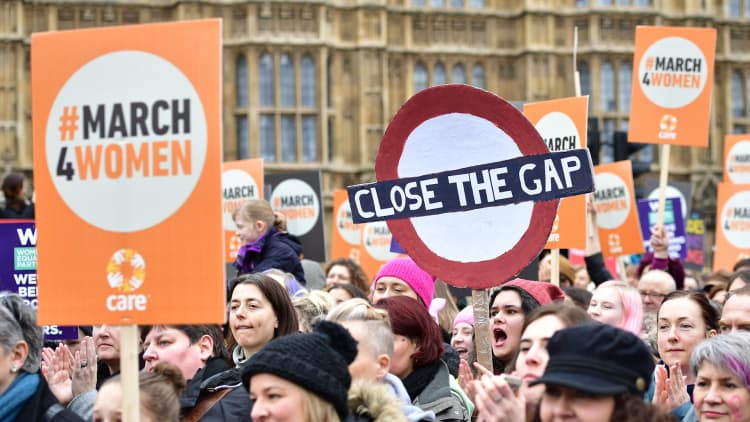Men outearn women in every country on earth. In the United States, women earn an average of $0.80 for every dollar earned by a man. This gap is even larger for African American and Latina women.
There are many causes for this pay gap, but one factor is that women are doing work they're not getting paid for. Uncompensated labor is often referred to as "invisible work," and includes essential household responsibilities like cleaning, child care and taking care of sick family members.
According to the Organisation for Economic Co-Operation and Development, men in the United States spend 150.2 minutes a day — about 17.5 hours a week — doing unpaid labor. Women spend 243.2 minutes doing unpaid labor each day — about 28.4 hours a week. When you add both paid and unpaid work together, women still work longer hours.
The Bureau of Labor Statistics reports that Americans earn an average of $26.82 an hour. This means that if men and women were compensated for their unpaid labor, men would earn an extra $469.35 a week, and women would earn an extra $761.69 a week — which comes out to nearly $40,000 a year.
(It's important to note that housekeeping professionals actually earn an average of $11.84 an hour and childcare workers earn $10.18 an hour. Even if invisible labor was compensated at just $10 an hour, men would earn an extra $175 a week and women would pocket $284 a week.)
Philanthropist and businesswoman Melinda Gates has spoken extensively about the ways in which invisible work impacts women and communities. Her research through the Bill and Melinda Gates Foundation suggests that persistent gender norms, in which men and women take on different household tasks, are still responsible for a huge imbalance in how much invisible work men and women do.
"In every country on every continent, women do more cooking, cleaning and caretaking," Gates writes in an email to CNBC Make It. "On average, women around the world spend 4.5 hours a day doing household chores, while men spend less than half as much time."
In the U.S., the gap created by unpaid labor is smaller, but still significant. And missed income is not the only way the invisible work gap hurts women — it also limits career development.

"When women are busy doing household chores, they have less time for paid work," explains Lauren McGoodwin, CEO and founder of Career Contessa and creator of The Salary Project, an initiative aimed at helping women better understand their market value and negotiate for higher wages. "This ends up robbing women of their potential for advancing within their careers, earning a higher salary and contributing enormously to the economy's growth through their paid jobs."
In a notable 2015 column for The New York Times, Facebook COO Sheryl Sandberg and Wharton Professor Adam Grant explored the personal and professional changes that can result from more equatable division of labor at home, citing research that shows that fathers who spend more time with their children experience greater satisfaction at work, as well as lowered blood pressure and rates of cardiovascular disease.
"Research shows that when men do their share of chores, their partners are happier and less depressed, conflicts are fewer, and divorce rates are lower. They live longer, too; studies demonstrate that there's a longevity boost for men (and women) who provide care and emotional support to their partners later in life."
Both McGoodwin and Gates suggest cultivating conversations that encourage men and women to split communal responsibilities more evenly.
"On Equal Pay Day, you often hear the rallying cry that women deserve 'equal pay for equal work.' And while that's pretty hard to argue against, it's also only part of the problem," says Gates. "To begin to address it, we must understand the factors that contribute to the wage gap, which include broader societal norms about the role of women at home and the value of their labor."
Like this story? Like CNBC Make It on Facebook.
Don't miss:



